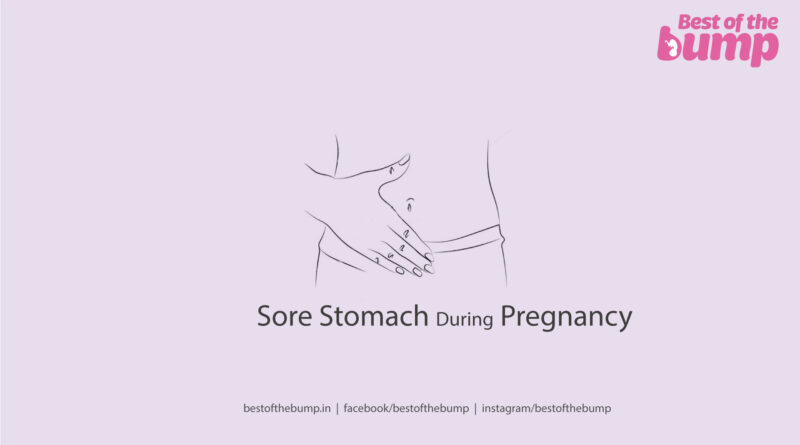Sore Stomach During Pregnancy
Sore Stomach During Pregnancy, pregnancy is a remarkable journey filled with joy and anticipation. However, it is also a time of numerous physical changes and challenges. One common issue many pregnant individuals experience is a sore stomach. While this discomfort can be alarming, it is often not a cause for major concern. In this comprehensive guide, we will explore the various factors that contribute to a sore stomach during pregnancy, along with effective management techniques to alleviate the discomfort.
What Causes a Sore Stomach During Pregnancy
Sore stomach during pregnancy can be attributed to various factors related to the physiological changes that occur in a woman’s body during this period. These factors include hormonal fluctuations, the growing uterus, and the pressure it exerts on surrounding organs.
The hormonal changes that accompany pregnancy can lead to various digestive issues such as constipation and bloating, which contribute to abdominal discomfort. As the pregnancy progresses, the uterus expands to accommodate the developing baby, resulting in increased pressure on the abdomen, leading to soreness and tenderness.
Furthermore, round ligament pain, which occurs as the ligaments supporting the uterus stretch and thicken, can cause sharp and fleeting pain in the lower abdomen. Braxton Hicks contractions, often referred to as “practice contractions,” can also contribute to a sore stomach during pregnancy.
While most instances of a sore stomach during pregnancy are not harmful to the baby, it is essential to pay attention to any severe or persistent pain, as it could indicate underlying issues that require medical attention. Consulting a healthcare professional can help determine the cause of the sore stomach and ensure the well-being of both the expectant mother and the baby.
Digestive Issues and Abdominal Pressure

Sore Stomach During Pregnancy, many expectant individuals may experience a sore stomach due to various factors, including digestive issues and abdominal pressure. Hormonal changes during pregnancy can lead to a slowing down of the digestive system, resulting in constipation and bloating. As the uterus expands to accommodate the growing baby, it exerts additional pressure on the abdominal region, exacerbating the discomfort.
Constipation can cause abdominal pain and discomfort as the bowel movements become less frequent and challenging. The accumulation of gas in the digestive tract can also contribute to bloating, making the stomach feel swollen and tender.
To alleviate sore stomachs caused by digestive issues, pregnant individuals are advised to adopt a healthy and balanced diet, rich in fiber, and drink plenty of water to prevent constipation. Regular physical activity can also aid digestion and reduce bloating. Additionally, avoiding foods that trigger gas and making dietary adjustments can help ease abdominal discomfort during pregnancy.
While sore stomachs due to digestive issues are generally not harmful to the baby, it is essential for expectant parents to consult their healthcare provider if the pain becomes severe or is accompanied by other concerning symptoms. Proper management of digestive problems can significantly enhance the overall comfort and well-being of pregnant individuals during this special journey.
Bloating and Improper Eating Habits
Sore Stomach During Pregnancy, bloating and improper eating habits can contribute to a sore stomach. Bloating occurs when excess gas builds up in the digestive system, causing discomfort and a feeling of fullness. Pregnant individuals may experience increased bloating due to hormonal changes that slow down digestion and relax the gastrointestinal tract.
Moreover, improper eating habits can exacerbate bloating and lead to a sore stomach. Indulging in processed or high-fat foods, overeating, and consuming carbonated beverages can all contribute to digestive disturbances. These habits can further strain the already sensitive digestive system during pregnancy, resulting in discomfort and abdominal pain.
To alleviate bloating and reduce the chances of a sore stomach during pregnancy, it is crucial to adopt healthy eating practices. Focus on consuming a well-balanced diet that includes plenty of fiber-rich fruits, vegetables, and whole grains. Smaller, more frequent meals can also help ease digestion and prevent excessive bloating.
Additionally, staying hydrated is essential in maintaining healthy digestion and preventing constipation, which can worsen bloating. It is advisable to avoid carbonated drinks and gas-producing foods to minimize discomfort.
By being mindful of eating habits and making conscious dietary choices, expectant parents can significantly reduce bloating and discomfort, promoting a more pleasant and enjoyable pregnancy experience. As always, consulting with a healthcare provider can provide personalized guidance and recommendations for managing bloating and sore stomach during pregnancy.
Round Ligament Pain
Sore Stomach During Pregnancy, many expectant individuals may experience a condition known as round ligament pain, which contributes to sore stomach discomfort. The round ligaments are bands of tissue that support the uterus, and as the pregnancy progresses, they undergo stretching and thickening to accommodate the growing baby.
The sensation of round ligament pain is often described as sharp, shooting pain or a dull ache on one or both sides of the lower abdomen. It typically occurs during sudden movements, such as standing up quickly, rolling over in bed, or sneezing, and can catch individuals off guard.
The pain is caused by the stretching of the round ligaments as the uterus expands and shifts position. While round ligament pain is generally harmless, it can be quite uncomfortable and concerning for expectant parents, especially during the second trimester.
To alleviate round ligament pain and sore stomach during pregnancy, individuals are advised to practice gentle movements, avoid sudden changes in position, and provide support to the abdomen with a maternity belt or suitable clothing. If the pain becomes severe, persistent, or is accompanied by other worrisome symptoms, seeking medical advice is essential to rule out any potential complications and ensure a healthy pregnancy journey.
Braxton Hicks Contractions
Braxton Hicks contractions are a common occurrence during pregnancy and can contribute to a sore stomach during this period. Often referred to as “practice contractions,” Braxton Hicks contractions are irregular and typically painless tightenings of the uterine muscles. These contractions can start as early as the second trimester and become more frequent as the pregnancy progresses.
While Braxton Hicks contractions are considered a normal part of pregnancy, they can sometimes cause discomfort in the lower abdomen, leading to a sore stomach. The tightening of the uterus during these contractions may be noticeable and can cause mild cramping sensations.
It’s important to differentiate Braxton Hicks contractions from true labor contractions, which typically become more regular, intense, and closer together as labor approaches. Braxton Hicks contractions, on the other hand, tend to be irregular and less intense.
To alleviate the soreness caused by Braxton Hicks contractions, expectant parents are advised to try relaxation techniques, such as deep breathing or changing positions. Staying hydrated and avoiding overexertion can also help manage discomfort. However, if there is any concern about the nature or intensity of contractions, it is essential to seek guidance from a healthcare professional to rule out pre-term labor or any potential complications.
Pre-term Labor and Pregnancy Complications
Sore Stomach During Pregnancy, a sore stomach is generally benign and caused by factors like digestive issues, round ligament pain, and Braxton Hicks contractions. However, in some cases, it can be associated with more serious concerns, such as pre-term labor and other pregnancy complications.
Pre-term labor occurs when regular contractions begin to open the cervix before 37 weeks of gestation. One potential symptom of pre-term labor is a persistent, intense sore stomach accompanied by back pain, pelvic pressure, or vaginal bleeding. If any of these symptoms arise, immediate medical attention is crucial to prevent premature birth, which can pose risks to the baby’s health and development.
Other pregnancy complications that might lead to a sore stomach include placental abruption, where the placenta separates from the uterus prematurely, and uterine fibroids, non-cancerous growths in the uterus that can cause pain and discomfort.
If an expectant mother experiences persistent or severe abdominal pain during pregnancy, especially before 37 weeks, it is essential to seek prompt medical evaluation to rule out any serious issues. Early detection and appropriate management of these complications are vital for ensuring a safe and healthy pregnancy journey for both the mother and the baby.
The Phases of Sore Stomach During Pregnancy
Sore stomach during pregnancy can manifest in different phases as the body adapts to the changes brought about by gestation. Understanding these phases can help expectant parents navigate the discomfort more effectively:
First Trimester: Early Adjustments
During the first trimester, the body undergoes significant hormonal shifts to support the developing embryo. As hormonal changes affect the gastrointestinal system, some individuals may experience a sore stomach. Additionally, nausea and morning sickness can contribute to stomach discomfort during this phase.
Second Trimester: Growing Pains and Round Ligament Pain
In the second trimester, the baby grows rapidly, and the uterus expands to accommodate the developing fetus. This growth can lead to soreness and discomfort in the abdominal region, often attributed to round ligament pain. As the ligaments stretch to support the uterus, expectant parents may experience sharp, fleeting pain on one or both sides of the lower abdomen.
Third Trimester: Braxton Hicks Contractions and Preparing for Labor

The third trimester brings more pronounced soreness, mainly due to Braxton Hicks contractions. These “practice contractions” can cause tightening and discomfort in the uterus and lower abdomen. As the body prepares for labor, the soreness may become more frequent but is usually not a cause for concern unless accompanied by other warning signs of pre-term labor.
Sore stomach during pregnancy is a normal and common occurrence that can vary in intensity during different phases of gestation. Being aware of these phases can help expectant parents better cope with the discomfort and ensure a smoother pregnancy journey. If any concerns arise or if the soreness becomes severe and persistent, it is essential to seek advice from a healthcare professional for proper evaluation and guidance.
Managing Sore Stomach During Pregnancy
Managing a sore stomach during pregnancy is essential to ensure the well-being and comfort of expectant parents. Here are some effective strategies for alleviating this discomfort:
Maintain a Balanced Diet
Maintaining a balanced diet is essential for managing a sore stomach during pregnancy. Focus on fiber-rich foods like fruits, vegetables, and whole grains to alleviate digestive issues and prevent constipation. Drink plenty of water to stay hydrated and promote healthy digestion. Incorporate lean proteins like poultry, fish, and legumes for proper nourishment. Avoid spicy, greasy, and heavy foods that may exacerbate discomfort. Smaller, more frequent meals can ease bloating and reduce pressure on the abdomen. Consult a healthcare provider for personalized dietary recommendations to ensure a healthy pregnancy and alleviate sore stomach symptoms.
Stay Hydrated
Staying hydrated is vital for managing a sore stomach during pregnancy. Adequate water intake helps prevent constipation and eases abdominal discomfort caused by bloating and digestive issues. Dehydration can exacerbate soreness and lead to other health complications. Pregnant individuals should aim to drink plenty of water throughout the day, maintaining a consistent fluid intake. Additionally, incorporating hydrating foods like fruits and vegetables can contribute to overall hydration levels. However, always consult with a healthcare provider for personalized hydration recommendations based on individual health needs and pregnancy progression.
Exercise Regularly
Exercising regularly during pregnancy can help alleviate a sore stomach and promote overall well-being. Safe and appropriate exercises, such as prenatal yoga and gentle stretches, can strengthen abdominal muscles and reduce digestive discomfort. Maintaining an active lifestyle may also aid in preventing constipation and bloating, which can contribute to a sore stomach. However, it’s essential to consult with a healthcare provider before starting any exercise routine during pregnancy. They can provide personalized guidance based on individual health conditions and ensure the safety of both the expectant parent and the baby.
Practice Good Posture
Maintaining good posture is crucial for alleviating sore stomach during pregnancy. Avoid slouching or arching the back, as it can strain the abdominal muscles and exacerbate discomfort. Instead, stand tall with shoulders relaxed and pelvis slightly tucked. While sitting, use a supportive chair and place a cushion behind the lower back. Engage in gentle stretching exercises to relieve tension in the abdomen and promote flexibility. Be mindful of body movements, especially when lifting objects, and remember to bend at the knees, not the waist. Practicing good posture can reduce the strain on the stomach and contribute to a more comfortable pregnancy experience.
Use Heat Therapy
Heat therapy can be a soothing and safe method to alleviate sore stomach during pregnancy. Applying a warm compress or using a heating pad on the abdomen can help ease discomfort caused by round ligament pain and muscle tension. The gentle warmth promotes relaxation, increases blood flow, and reduces inflammation, providing relief without harmful effects on the baby. However, it’s crucial to use heat therapy with caution and not apply excessive heat or leave it on for extended periods. Always consult with a healthcare professional before using any heat therapy during pregnancy to ensure its suitability for your specific condition.
Get Sufficient Rest
Sore Stomach During Pregnancy, getting sufficient rest is crucial, especially when dealing with a sore stomach. Adequate rest helps the body recover and promotes overall well-being. When experiencing abdominal discomfort, lying down in a comfortable position and supporting the belly with pillows can provide relief. Additionally, taking short naps throughout the day can help combat fatigue and discomfort. Prioritizing rest ensures that the body can better cope with the physical changes of pregnancy, including digestive issues and round ligament pain. Always listen to your body’s signals and seek medical advice if the sore stomach persists or worsens.
Avoid Trigger Foods
To alleviate a sore stomach during pregnancy, it’s essential to avoid trigger foods that can exacerbate digestive issues and discomfort. Steer clear of greasy, spicy, and fatty foods as they can lead to bloating and indigestion. High-fiber foods might worsen constipation, so consume them in moderation and ensure proper hydration. Carbonated drinks and caffeine can also contribute to stomach discomfort. Opt for smaller, frequent meals to prevent overeating and reduce pressure on the abdomen. Listen to your body and identify specific foods that cause discomfort, making conscious choices to promote a more comfortable and enjoyable pregnancy experience.
Consider Maternity Support Belts
Maternity support belts can be beneficial for alleviating sore stomachs during pregnancy. These specialized belts provide gentle compression and support to the abdomen, relieving pressure on the ligaments and muscles. By helping to distribute the weight of the growing baby, these belts can ease discomfort and reduce strain on the lower back, hips, and pelvis. Maternity support belts are particularly helpful for individuals experiencing round ligament pain or pelvic discomfort. It’s essential to consult with a healthcare professional before using a support belt to ensure proper fit and to determine if it’s suitable for individual needs during pregnancy.
Use Pillows for Comfort

Sore Stomach During Pregnancy, using pillows for comfort can be incredibly helpful in alleviating a sore stomach. Placing a pillow between the knees while sleeping on your side can reduce pressure on the abdomen and ease round ligament pain. Additionally, supporting the back with a pillow while sitting or reclining can promote better posture and alleviate backaches associated with a sore stomach. Opting for a pregnancy wedge pillow can provide targeted support to the belly, reducing strain on the stomach muscles. Pillows are a simple yet effective way to enhance comfort and ensure a more restful and pain-free pregnancy experience.
Consult with a Healthcare Provider
Sore Stomach During Pregnancy, if you are experiencing a sore stomach during pregnancy, it is essential to consult with a healthcare provider. While this discomfort is often normal and can be attributed to various factors like hormonal changes, round ligament pain, or Braxton Hicks contractions, it’s crucial to rule out any serious issues. Your healthcare provider can conduct a thorough assessment, provide personalized advice, and ensure your pregnancy is progressing smoothly. Early detection of any potential complications or warning signs of pre-term labor can lead to timely interventions, ensuring the best possible outcome for you and your baby. Don’t hesitate to seek professional medical guidance for peace of mind and proper car.
When to Seek Medical Attention
Sore Stomach During Pregnancy, if you experience a sore stomach during pregnancy and notice severe or persistent pain, vaginal bleeding, fever, or other alarming symptoms, it is essential to seek immediate medical attention. These warning signs could indicate potential complications, pre-term labor, or other serious issues that require prompt evaluation by a healthcare professional. Do not hesitate to contact your healthcare provider if you have any concerns or uncertainties about your abdominal discomfort during pregnancy. Timely medical intervention can ensure the well-being of both you and your baby.
Sore Stomach During Pregnancy is a common occurrence caused by a variety of factors, including hormonal changes, digestive issues, and uterine contractions. Understanding the underlying reasons and implementing effective management techniques can significantly improve comfort and overall well-being during this precious time. Remember, always consult a healthcare professional if you have concerns or encounter any alarming symptoms. With proper care and attention, most pregnant individuals can navigate this discomfort and focus on the excitement of welcoming their new bundle of joy.
See This Also




